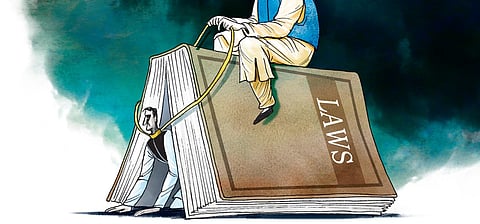

It is debatable whether any intervention earlier than March 21 would have helped combat the depredations of the coronavirus. To the government, the Parliament session and Madhya Pradesh obviously mattered. In any case, a janata curfew was observed the very next day to test the waters before a total lockdown. While people stayed indoors and came out only at 5 pm as advised, to clap hands and bang pots, officials were feverishly working behind closed teak doors to finalise the operational details of how to seal a nation so large, unmanageable and rather restless. Two days later, the prime minister announced, in his dramatic style, that everything would remain shut down for the next three weeks to halt the deadly dance of the virus.
The curtailment of civil liberties is, of course, an essential ingredient of every battle, but questions arose immediately about the timing, length, effectiveness, proportion of penalties, human rights and so on. The next morning and thereafter, these weighty issues were resolved by long sticks that the police wielded quite effectively all over the nation, in a synchronised demonstration of state power. Despite audio-visual clips in social media and top billing in the mainstream media about ‘police high-handedness’, citizen-state relations were established unambiguously. What most observers missed was the smoothness with which the home ministry appropriated all powers overnight, almost like during the much reviled ‘Emergency’ of 1975-77.
Two laws that mattered were obviously tilted in favour of the home ministry, which, incidentally, is headed by the prime minister’s most trusted colleague. A cryptic colonial law of just one and a half pages called The Epidemic Diseases Act of 1897 was pulled out of some mothballed locker as it empowers the Centre to check inter-state and international movement of vessels and passengers. Section 2, however, declares that state governments could practically suspend the operation of normal laws and liberties. The other Act that actually came in more handy was passed in 2005 during the regime of a more peaceable prime minister and is meant to tackle exigences like cyclones, floods and earthquakes.
This Disaster Management Act is a rather verbose piece of literature, rife with good intentions, so typical of a bureaucracy that dreads making any mistake. But if one looks at it from the angle in which it is used in its finest hour, the underlying theme is clear—the total centralisation of power. Under a liberal regime, such megalomanic sections would, of course, be justified as “enabling provisions”. These were enough to subordinate the ministries of civil aviation, railways, shipping and transport and others, transforming them into mere departments under the home ministry.
Under the 2005 Act, a central secretary can and does tick off state chief ministers and directs them on what to do in their own localities that babus of Delhi would not even find on a Google map. One wonders whether bureaucrats could think of bullying a CM like Narendra Modi in 2001, when he was handling relief operations after the Bhuj earthquake. Well, Section 6(2)(i) of this Act does empower the home secretary, surely a very harassed officer, to issue his regular fatwas but consultations with either states or central ministries appear to have disappeared or are acts of tokenism.
This is just one more example of the complete arrogation of all powers that this government has perfected. Its slogan of “Minimum Government, Maximum Governance” disappeared somewhere along the way, much before corona hit. The home secretary is, of course, only the front face of an ever-advancing regime and is surely acting on behalf of his minister, who remains in the shadows, as the Act has left him out. In fact, Section 6(3) of this Act empowers the PM to effectively centralise all decision-making with himself, in his capacity as chairman of the National Disaster Management Authority. This, he has surely done, even without invoking this section.
But Acts passed by Parliament after due consideration also enjoin responsibilities, and so does this one. Section 11 mandates that a ‘National Plan’ has to be made out, which has not been done. The health ministry is almost invisible and apparently demoralised, which is not good. It came in, however, for adverse publicity when its procurement of life-saving protective equipment for doctors and very critical testing kits was unduly delayed. This was where the PM could have used his powers under Section 50(a) of the Act to cut through the bureaucratic tangles.
Besides, if Donald Trump can appear with an independent expert like Dr Fauci, it appears odd that updates and briefings in India are mainly by civil servants, however competent they are. Comments and advisories by senior doctors and scientists would certainly be more credible than ludicrous statements made by a paediatrician with no epidemiological exposure who is now a Niti Aayog member. Besides, the cavalier and insensitive handling of the problem of migrant labourers may have been exacerbated as public representatives and civil society are excluded from decision-making.
The jealous guarding of the Centre’s fiefdom and its constant self-glorification can only jeopardise very-necessary relations with subjugated and fund-starved states that are on the front line. The virus does not discriminate and the much promised ‘cooperative federalism’ would surely have produced better results. The point is that bureaucrats will definitely carry out orders, and more effectively so if the boss is really powerful, but they can never acquire the natural sensory nerves that grassroots politicians inherit. After all, in an excitable federal democracy, only hard top-down orders may not suffice.
Jawhar Sircar
Retired civil servant. Former Culture Secretary and ex-CEO, Prasar Bharati
(Tweets @jawharsircar)